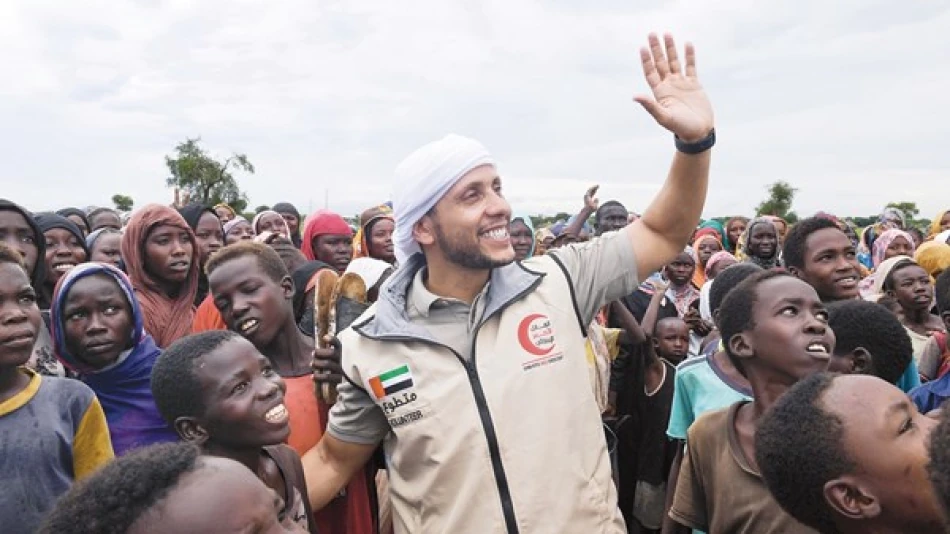
UAE's Rich Legacy of Benevolence and Generosity
UAE Emerges as Global Humanitarian Superpower with $98 Billion in Aid Since 1971
As the world marks World Humanitarian Day on August 19, the United Arab Emirates stands out as a rare example of a nation that has transformed oil wealth into systematic global compassion. With $98 billion in foreign aid distributed since 1971, the UAE has quietly built one of the world's most effective humanitarian response systems, often reaching disaster zones faster than traditional international organizations.
The Numbers Tell a Compelling Story
The UAE's humanitarian footprint has reached staggering proportions. Since federation in 1971, the country has distributed 360 billion dirhams ($98 billion) in foreign assistance—a figure that places it among the world's top donors relative to national income. This isn't merely charity; it's strategic soft power deployment that has earned the UAE unprecedented respect in international circles.
In 2024 alone, the UAE ranked first among Arab nations and second globally in humanitarian aid to Gaza, contributing $204 million. For Sudan, the UAE has provided over $3.5 billion in assistance over the past decade, with an additional $100 million pledge for ongoing crisis response.
Institutional Evolution: From Ad Hoc to Strategic
New Architecture for Global Impact
October 2024 marked a watershed moment with the establishment of the UAE International Aid Agency through federal decree. This institutionalization signals the UAE's transition from reactive charity to proactive humanitarian strategy—a move that mirrors Singapore's development aid evolution and positions the UAE as a serious competitor to traditional Western donors.
The creation of the International Humanitarian Affairs Council further demonstrates this strategic shift. Unlike previous humanitarian efforts that relied on royal directives, this new framework suggests systematic, long-term planning that could outlast individual leadership changes.
The Zayed Legacy Initiative: $5.4 Billion Game Changer
President Sheikh Mohamed bin Zayed's launch of the "Zayed Humanitarian Legacy Initiative" with 20 billion dirhams ($5.4 billion) in funding represents more than generous giving—it's nation branding at scale. The initiative, institutionalized through the Zayed Humanitarian Legacy Foundation, positions the UAE as a humanitarian superpower capable of responding to multiple global crises simultaneously.
Strategic Geographic Focus: Why These Regions Matter
The Sudan Investment
The UAE's massive commitment to Sudan—over $3.5 billion since 2014—reflects both humanitarian concern and strategic calculation. Sudan's location at the crossroads of Africa and the Middle East makes it crucial for regional stability. The UAE's support for Sudanese refugees in Chad and Uganda, including 30,000 food baskets, demonstrates understanding that refugee crises require regional solutions.
Gaza and Palestine: Balancing Act
The UAE's position as the second-largest global donor to Gaza in 2024 represents sophisticated diplomacy. Through "Operation Gallant Knight 3," the UAE has maintained humanitarian engagement while navigating complex regional politics. The establishment of a floating hospital at Egypt's Al-Arish port and six water desalination stations serving over one million people showcases the UAE's preference for infrastructure over temporary relief.
Operational Excellence: Speed as Competitive Advantage
The UAE's humanitarian operations consistently outpace traditional international organizations in response time. This speed advantage stems from streamlined decision-making processes and pre-positioned resources. When Lebanon needed assistance, the UAE delivered $100 million in emergency aid plus an additional $30 million for Lebanese refugees in Syria—decisions made and implemented within days, not months.
The "Birds of Goodness" operation, dropping humanitarian supplies to isolated areas in Gaza, exemplifies this rapid-response capability. Such operations require sophisticated logistics networks that few countries can match.
Global Implications: Reshaping Humanitarian Landscape
Competition for Traditional Donors
The UAE's humanitarian expansion challenges Western donor dominance. Unlike traditional aid that often comes with governance conditions or lengthy bureaucratic processes, UAE assistance arrives quickly with minimal strings attached. This approach appeals to recipient countries frustrated with traditional donor requirements.
The UAE's $50 million contribution to the Islamic Development Bank's Livelihood and Livelihood Fund, alongside agreements with the World Health Organization for global emergency logistics centers, suggests ambitions beyond regional influence toward global humanitarian leadership.
The Soft Power Dividend
Every UAE field hospital, mobile cardiac clinic, or water desalination plant serves dual purposes: addressing immediate needs while building long-term relationships. This strategy has proven remarkably effective, with recipient countries increasingly viewing the UAE as a reliable partner rather than a donor with ulterior motives.
Looking Forward: Sustainability Questions
The 2025 World Humanitarian Day theme—"Enhancing Global Solidarity and Empowering Local Communities"—aligns perfectly with UAE strategy. However, questions remain about long-term sustainability as oil revenues face pressure from global energy transition.
The UAE's institutional reforms suggest awareness of this challenge. By creating permanent agencies and foundations, the country is building systems designed to outlast commodity price cycles. Whether this model proves sustainable will likely determine if other resource-rich nations follow the UAE's humanitarian diplomacy playbook.
The UAE's transformation from regional player to global humanitarian leader represents one of the most significant shifts in international aid architecture since the post-World War II era. As traditional donors face budget constraints and political pressures, the UAE model offers a compelling alternative that prioritizes speed, effectiveness, and minimal conditionality over bureaucratic processes and governance requirements.
Most Viewed News

 Layla Al Mansoori
Layla Al Mansoori






